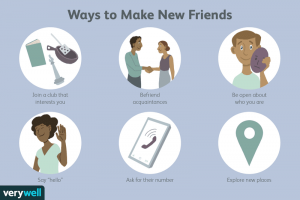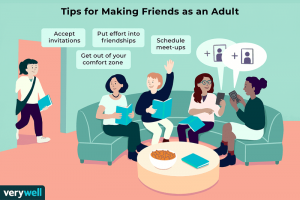Growing up, I always had a strong community around me.
Whether it was family, friends, coaches, or sports teammates, I felt secure in the social area. The same goes for my 20s and most of my 30s — my community was vast.
And then it began to shrink — by a lot. Friends got married and had kids, they moved across the country or were busy with work or just life, in general, and my community was less available. Don’t get me wrong, they’re still in my life, they’re just not as accessible as they once were.
That’s how life goes, and since I’m single and don’t have the same obligations, should I spend all my free time alone or seek out new communities?
My instinct is to stay where I am — I’m much more comfortable with complacency than putting myself out there to new people (classic extroverted introvert behavior, according to my therapist).
But it’s not just about making new friends — a community serves as a social safety net, and that’s important to have.
What Is A Community?
“According to clinical and community psychologist David McMillan, a community is defined by four criteria: membership, influence, integration and fulfillment of needs, and shared emotional connection,” says Vox.
“To be part of a community, you must feel a sense of belonging (membership), feel like you make a difference to the group and that the group makes a difference to you (influence), feel like your needs will be met by other group members (integration and fulfillment of needs), and feel that you share history, similar experiences, time, and space together (shared emotional connection).
From extracurricular pursuits to shared living, the participation revolves around group cooperation and fulfillment.
While a community can include pairs or smaller cliques of friends — and aid in promoting those connections — community members don’t have to be friends.
“In contrast, friendship ‘Is an invested, dedicated, platonic relationship where two people who are friends with each other are committed to the growth, the well-being, the support, the thriving of each other,’” explains Kat Vellos, a connection coach, speaker, and author of the book We Should Get Together: The Secret to Cultivating Better Friendships.
A community can also be helpful in rare and special circumstances.
For instance, a neighbor can lend you a tool you need to start or finish a DIY project. A younger person in your dog park may have knowledge about pet sitters or training. An older community member may be able to offer financial advice for retirement planning.
Speaking of retirement planning, it’s an apt comparison for a community — it’s comparable to a 401(k) but for your social life — a safety net of people who can help.
How To Make Friends As An Adult
Where To Find Friends/Community
Take stock of your interests and what you’d like to do in your free time and the people who share in those interests!
There are a lot of places to find your people: religious communities, social clubs, dog parks, neighborhoods, and even online social apps. For instance, if you want to learn a new skill or hobby, find places where you can gather with a group to do those activities. It’s an easy way to connect with others who share your enjoyment and expand your social circle.
When you potentially find “your people,” pay attention to whether they give you energy or sap it, how you feel when you’re around them, whether the relationship is reciprocal, having things in common, etc. Not everyone you meet will end up a close friend, and that’s okay – acquaintances still count as a community.
Keep On Showing Up
Showing up is important, so make it a habit to attend scheduled events so you can build your community and show you’re invested in the relationships.
Be attentive during events, come early to help with tasks or stay late to clean up, as it shows you’re interested in being and staying a part of a particular community.
Show Interest In Those Around You
Just showing up isn’t always enough — you have to be an active part of the group. Extend yourself socially and, most of the time, others will reciprocate. Getting to know the five love languages will help you here, as people can express and receive love in different ways.
Friendships begin with mutual interests and can be built upon from there, so start conversations and engage with others in the group you think you’d like to get to know better. There’s always the risk they won’t want to engage with you, but don’t take rejection to heart. Not everyone is looking for a deeper connection, and that’s okay!
Don’t Spread Yourself Too Thin
There’s no need to join a ton of groups to be part of a community. Start with one and build from there. You may hit the jackpot with your first group, or it may not be a successful endeavor. That’s when you branch out to another group where you’ll fit in and, hopefully, find “your people.”
Every new person you meet is a connection and possibly a potential friend — and you’re building a network, which is how a community is built.

Do you find these tips on how to make friends as an adult helpful? Let us know in the comments!
There Are More Health And Wellness Articles For You Below:



